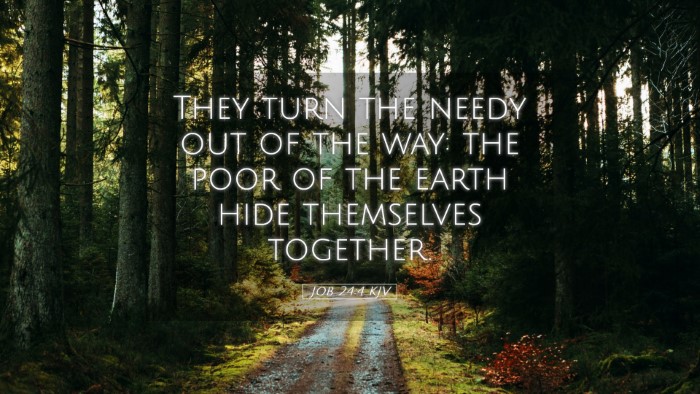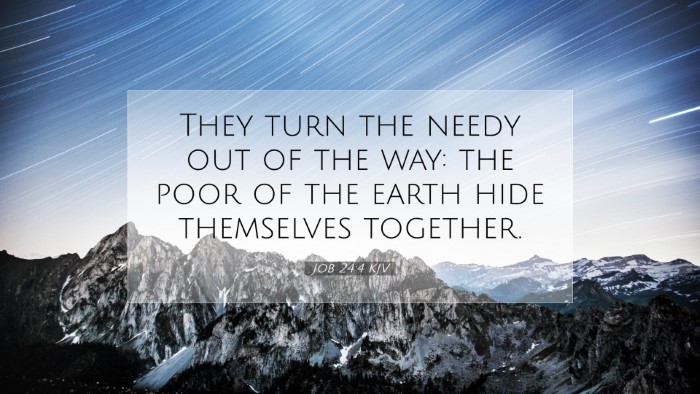Old Testament
Genesis Exodus Leviticus Numbers Deuteronomy Joshua Judges Ruth 1 Samuel 2 Samuel 1 Kings 2 Kings 1 Chronicles 2 Chronicles Ezra Nehemiah Esther Job Psalms Proverbs Ecclesiastes Song of Solomon Isaiah Jeremiah Lamentations Ezekiel Daniel Hosea Joel Amos Obadiah Jonah Micah Nahum Habakkuk Zephaniah Haggai Zechariah MalachiJob 24:4
Job 24:4 KJV
They turn the needy out of the way: the poor of the earth hide themselves together.
Job 24:4 Bible Commentary
Commentary on Job 24:4
Job 24:4: "They turn the needy out of the way: the poor of the earth hide themselves together."
Introduction
Job 24:4 presents a poignant observation of social injustice and human suffering. In this verse, Job articulates the plight of the needy and the poor, capturing the essence of their marginalization. This verse acts as a microcosm of the broader themes of suffering, justice, and the fate of the righteous versus the wicked that permeate the book of Job.
Historical Context
The dialogue in the Book of Job occurs in a context where the nature of God's justice is being questioned. Job, a man of integrity yet beset by tremendous suffering, argues for the existence and acknowledgment of injustice in the world. The surrounding culture often equated prosperity with divine favor, thus leading to the erroneous belief that the suffering were inherently sinful. In contrast, Job challenges this notion by highlighting the reality of the righteous suffering and the wicked prospering.
Analysis of the Verse
- The Needy and the Poor: Job's reference to "the needy" and "the poor" encompasses more than mere economic status; it reflects a social condition that signifies vulnerability and marginalization. Throughout the biblical narrative, the marginalized often serve as a focal point for God's concern, emphasizing His compassion toward the afflicted.
- The Context of Injustice: The phrase "They turn the needy out of the way" suggests a deliberate act of oppression and exclusion. It indicates not only a physical displacement but also a rejection of humanity and dignity. The imagery evokes a society where the powerful misuse their positions to exploit the vulnerable, an unjust dynamic that resonates throughout history.
- Social Implications: The actions described depict a society steeped in moral decay. The poor "hide themselves together," which illustrates their shared plight against the powerful. This hiding could symbolize despair, weakness, or a strategic withdrawal from a hostile environment, indicating the psychological impact of systemic injustice.
Insights from Matthew Henry
Matthew Henry emphasizes the moral decay of society and the fundamental injustices faced by the needy. He notes that when the affluent and powerful "turn the needy out of the way," they demonstrate a lack of compassion and accountability. According to Henry, this verse illustrates a crucial aspect of human nature: the propensity to disregard the less fortunate for personal gain.
Insights from Albert Barnes
Albert Barnes views this verse within the broader context of divine justice. He points out that Job's lamentation highlights the problem of the apparent prosperity of the wicked, contrasting it with the suffering of the innocent. Barnes underscores that although the poor may hide as a result of oppression, their plight does not escape God's notice. Barnes argues for the eventual divine retribution against those who perpetrate such injustices.
Insights from Adam Clarke
Adam Clarke elaborates on the societal implications of Job's observations. He interprets the "needy" as representative of those who lack power and privilege. Clarke argues that this exclusion serves to underline a broader theological truth; God’s concern for the marginalized reflects His justice. Additionally, Clarke discusses the psychological state of the needy who must resort to hiding, signifying the depths of despair induced by oppression.
Theological Implications
This verse prompts careful theological reflection concerning God’s nature and justice. It addresses the question of why the righteous suffer while the wicked thrive—themes deeply embedded in the suffering of Job himself. The social injustices highlighted call for examination of personal and corporate complicity in systemic wrongs.
God's Justice in Human Affairs
While the verse depicts a bleak picture of human society, it is a reminder of the hope found in God’s ultimate justice. It challenges believers to seek not only personal righteousness but also collective responsibility in advocating for those who cannot advocate for themselves.
Practical Applications for Today
For pastors and theologians, Job 24:4 serves as a call to action regarding social justice. It invites congregations to engage with the realities of poverty and oppression. Students of the Bible are urged to confront these difficult truths within their contexts, ensuring that the voice of the needy is not silenced in the pursuit of wealth or power.
Conclusion
Job 24:4 encapsulates a profound reflection on societal injustice, the plight of the marginalized, and the overarching question of divine justice. Through the insights of commentators like Matthew Henry, Albert Barnes, and Adam Clarke, we see that the inquiry into the suffering of the innocent is central to understanding God's character and the moral responsibilities of His followers. This verse remains relevant and challenges modern readers to promote justice, compassion, and advocacy for the needy within their communities.


